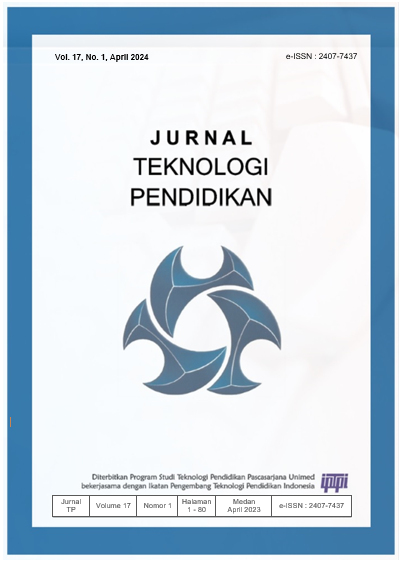ANALISIS STUDENT COURSE ENGANGEMENT DAN FAKTOR-FAKTOR YANG MEMPENGARUHINYA: STUDI KASUS PADA MAHASISWA FAKULTAS EKONOMI UNIVERSITAS NEGERI MEDAN
DOI:
https://doi.org/10.24114/jtp.v17i1.57398Abstract
Abstract: Abstract: As students, they have the responsibility to study and fulfill all existing academic obligations. However, on the other hand, they are also expected to be actively involved in activities related to their lectures. In this study, the concept of student involvement in general in the context of lectures was used to facilitate the collection of main and supporting data. The purpose of this research is to evaluate the extent to which students are involved in the lecture process at the Faculty of Economics, State University of Medan. In addition, the purpose of this study also involves examining the relationship between student involvement in lectures and other variables, such as the Grade Point Average (GPA), gender, and the number of activities attended both on and off campus. This study was conducted using a survey method on students who actively participate in lecture activities, namely students who have filled out the KRS in the even semester. The collected data will be tested with structural equation modeling (SEM). The results of this study indicate that accounting education students have high student course engagement and the GPA variable has an influence on student course engagement with a t-statistic of 1,965, gender has an effect on student course engagement with a t-statistic of 15,166, outdoor and on-campus activities have an effect on student engagement course with a t-statistic of 10,958. Keywords: student course engagement, engagement. Abstrak: Sebagai mahasiswa, mereka memiliki tanggung jawab untuk belajar dan memenuhi semua kewajiban akademik yang ada. Namun, di sisi lain, mereka juga diharapkan untuk terlibat secara aktif dalam kegiatan yang terkait dengan perkuliahannya. Dalam penelitian ini, digunakan konsep keterlibatan mahasiswa secara umum dalam konteks perkuliahan untuk memudahkan pengumpulan data utama dan pendukung. Tujuan dari penelitian ini adalah untuk mengevaluasi sejauh mana atau seberapa besar mahasiswa terlibat dalam proses perkuliahan di Fakultas Ekonomi Universitas Negeri Medan. Selain itu, tujuan dari penelitian ini juga melibatkan pengujian hubungan antara keterlibatan mahasiswa dalam perkuliahan dengan variabel lainnya, seperti Indeks Prestasi Kumulatif (IPK), jenis kelamin, dan jumlah kegiatan yang diikuti baik di dalam dan di luar kampus. Studi ini dilakukan dengan metode survei pada mahasiswa yang aktif megikuti kegiatan perkuliahan yaitu mahasiswa yang sudah mengisi KRS pada semester genap. Data yang terkumpul akan di uji dengan structural equational modeling (SEM). Hasil dari penelitian ini menunjukkan bahwa mahasiswa pendidikan akuntansi memiliki student course engagement yang tinggi serta varibel IPK memiliki pengaruh terhadap student course engagement dengan t-statistik 1.965, Jenis kelamiin berpengaruh terhadap student course engagement dengan t-statistik 15.166, kegiatan luar dan dalam kampus berpengaruh terhadap student course engagement dengan t-statistik 10.958. Kata Kunci: student course engagement, keterlibatan, mahasiswa.References
Animesh, A., Pinsonneault, A., Yang, S.-B., & Oh, W. (2011). An Odyssey into Virtual Worlds: Exploring the Impacts of Technological and Spatial Environments. MISQ, 35(3).
Appleton, J. (2014). Student Engagement with School: Critical Conceptual and Methodological Issues of The Construct James. Journal of Adolescence, 74(4).
Aslamawati, Y., Enoch, E., & Halimi, A. (2016). Hubungan College Engagement Dengan Prestasi Akademik Mahasiswa Muslim di Bandung. Psympathic: Jurnal Ilmiah Psikologi, 2(1). https://doi.org/10.15575/psy.v2i1.444
Axelson, R. D., & Flick, A. (2010). Defining Student Engagement. Change: The Magazine of Higher Learning, 43(1). https://doi.org/10.1080/00091383.2011.533096
Bingham, B. E., Rea, V., Robertson, L., Smith, M. A., & Jacobs, S. (2022). Frequency, topic, and preferences: Tracking student engagement with several modalities of student“instructor contact in a first-year course. FEBS Open Bio, 12(1). https://doi.org/10.1002/2211-5463.13315
Dharmayana, I., Masrun, -, Kumara, A., & Wirawan, Y. (2012). Keterlibatan Siswa (Student Engagement) Sebagai Mediator Kompetensi Emosi Dan Prestasi Akademik. Jurnal Psikologi UGM, 39(1).
Fredricks, J. A., Blumenfeld, P. C., & Paris, A. H. (2004). School engagement: Potential of the concept, state of the evidence. In Review of Educational Research (Vol. 74, Issue 1). https://doi.org/10.3102/00346543074001059
Hair, J. F., Black, W. C. & Babin, B. J. (2010). Multivariate Data Analysis: A Global Perspective, Pearson Education. New Jersey, USA.
Hair, J. F., Black, W. C., Babin, B. J., & Anderson, R. E. (2014). Multivariate Data Analysis (7th ed.). Pearson Education.
Handelsman, M. M., Briggs, W. L., Sullivan, N., & Towler, A. (2005). A Measure of College Student Course Engagement. Journal of Educational Research, 98(3). https://doi.org/10.3200/JOER.98.3.184-192
Lin, S. H., & Huang, Y. C. (2018). Assessing College Student Engagement: Development and Validation of the Student Course Engagement Scale. Journal of Psychoeducational Assessment, 36(7). https://doi.org/10.1177/0734282917697618
Mapiasse, S. (2007). Influence of the democratic climate of classrooms on student civic learning in North Sulawesi, Indonesia. International Education Journal, 8(2).
Mustika, R. A., & Kusdiyati, S. (2015). Studi Deskriptif Student Engagement pada Siswa Kelas XI IPS di SMA Pasundan 1 Bandung. Prosiding Psikologi.
Selim Gunuc, A. (2014). The Relationships Between Student Engagement and Their Academic Achievement. In International Journal on New Trends in Education and Their Implications October. www.ijonte.org
Siregar, A. J. (2016). Student Engagement dan Parent Involvement Sebagai Prediktor Prestasi Belajar Matematika Siswa SMA Yogyakarta. Indigenous: Jurnal Ilmiah Psikologi, 1(1). https://doi.org/10.23917/indigenous.v1i1.1769
Stokes, T., Sheridan, B., & Baird, D. (2009). A Students Guide to Taking Back the Classroom. Encounter, 22, 31“36.
Tin, S. (2012). Penggunaan Media Teknologi, Student Engagement, dan Kinerja Dalam Pembelajaran Akuntansi: Studi Kasus pada Accounting Software œAccurate. In Jurnal Akuntansi (Vol. 4, Issue 1).
Downloads
Published
How to Cite
Issue
Section
License
Copyright (c) 2024 Jurnal Teknologi Pendidikan (JTP)

This work is licensed under a Creative Commons Attribution 4.0 International License.

Jurnal Teknologi Pendidikan (JTP) is licensed under a Lisensi Creative Commons Atribusi 4.0 Internasional.




